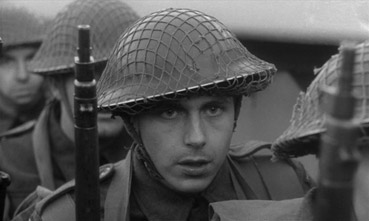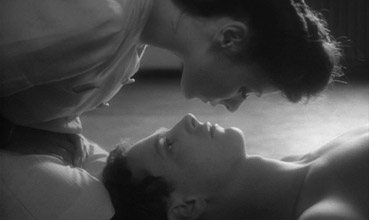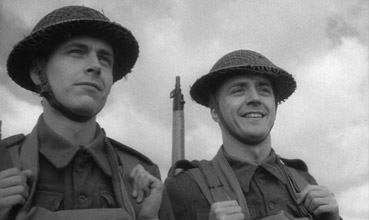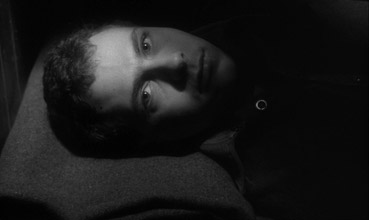| "I've
got nothing now. I've thrown it all away." |
| Tom |
Thinking back, I must have first seen
Overlord about four years after it was
first released in the UK, but I can't for the life of
me remember exactly when or where. But I do remember
my reaction to it. I was stunned. It wasn't just the
sometimes seamless marrying of archive footage to freshly
shot material – impressive though that is – it was the
sheer poetry of the piece. Oh, I know that drawing
comparisons between two vastly different media can
sound pretentious or like an attempt to excuse an absent
or fragmented narrative, but no other term seemed to
better capture this extraordinary film's unique handling of
its subject matter. And years later, having seen the film
for the first time in I don't know how long, I have no trouble standing
by that claim.
In those pre-DVD, pre-internet days,
it was hard for an ordinary working stiff to find out much about the film's director,
Stuart Cooper, or to see anything else he'd made. It
was years before I saw an interview with him and cannot
describe the shock I got at discovering that he was American.
This is not the emergence of some previously buried xenophobia, it's just that Overlord is so...well...British – I'd
even risk saying English – that it seemed inconceivable
it could actually be the work of anyone but a born and bred Brit.
And I'm not talking about the story itself, which could
easily be adapted to accommodate an American abroad,
but the fine detail, the dialogue and delivery,
the so-real exchanges between soldiers, the small
hesitations and uncertainties of the characters, and
the overriding sense of restraint in the handling
of an intimate story in an almost apocalyptic setting.
I wasn't the only one so smitten. A shared love of the
film was one of the things that contributed to the strongest
friendship I ever had, while Los Angeles film obsessive
Jerry Harvey was so struck by it that he programmed
a season of work by this relatively unknown filmmaker
on the famed Z Channel,
with Overlord as its
centrepiece.

Originally planned as a documentary to
mark the thirtieth anniversary of D-Day landings, the project
was instigated by the Imperial War Museum, whose extensive
cooperation and assistance throughout the production
was to prove essential to Cooper's approach. Cooper and co-screenwriter
Christopher Hudson were also given access to letters
and diaries of soldiers who took part in the D-Day landings,
which they drew on extensively in the construction of
their script.
On paper the story is a simple one. It's
1944, and innocent, 20-year-old Tom has been called up to
serve his country, and in the course of his basic training
becomes friends with fellow recruit Arthur and the more
experienced Jack. As their company trains for what will
eventually become the D-Day landings, all three start to
have doubts about the upcoming invasion, and Tom begins
experiencing premonitions of his own death. This is hauntingly visualised
as a combination of Robert Capa's iconic Spanish civil
war photograph Death of a Loyalist
Soldier and Charles
Bronson's slowed-down, blurred memory of a childhood trauma
from
Once Upon a Time in the West.
It's Tom's fatalism that sets him apart from any number of innocents sent to war in movies
before and since, as he not only firmly believes he will
die but calmly accepts its inevitability. This gives rise
to a blackly-comic off-screen moment when we learn that he
has asked his superiors for compassionate leave, which he plans to use to visit
his family to console them for a death that is going to
happen rather than one that has already occurred. A more tellingly representation of Tom's conviction lies with the fate of a letter he has written to his parents that
he is forbidden to carry on the invasion itself and required
to send home or burn – in the light of his belief,
the fact that he chooses the latter can't help but seem like a symbolic
cremation. Other pointers to his possible demise emerge
without ever feeling forced: the
requirement that he name his next of kin and fill out a 'will
form'; the tumble he takes on manoeuvres that is shot
in the same manner as his premonition; the memory (or perhaps
fantasy?) of his brief time with a girl he meets at a dance
(in a wonderfully naturalistic exchange), where she uses him to demonstrate
how the dead are prepared for burial.

Overlord is not
an anti-war film per se, but one that poignantly communicates
the sense of wasted life that comes with sending young
men on mass into an armed conflict of this scale. "Cannon
fodder, that's what we are," muses Arthur at
one point, vocalising the fears of his comrades, in spite
of the fact that none have yet seen a shot fired in anger.
Their disillusionment comes largely from their role as tiny cogs
in a giant and faceless machine, one in which the mechanics of
war are far more visible than the people that drive it
and die at its hands. This is extended to
the editing of the archive material, where the night-time
bombing of German cities, shown as hypnotically abstract
firework display, is intercut with brief but perfectly
chosen footage of the results of such destruction. It's
a familiar technique used here with commendable restraint – the
blows with which Cooper and his editor Jonathan Gili (later
a documentary filmmaker in his own right) deliver their
message may be small, but are driven home with persuasive precision.
The blending of archive footage with
newly shot material is crucial to Overlord's
structure, tone and intentions, and never for a moment does it smack
of gimmickry. A trained eye will have little trouble differentiating
the two in the early stages (the more fidgety camera style
on the documentary material is a key pointer), but as the
film progresses it is only the scale of the content – even
with MoD assistance it seems unlikely Cooper would have
been able to re-stage the rehearsals for the Normandy landings
on Poole beach – that
give the game away. The archive footage is often fascinating
in itself, the result of an estimated three-thousand hours
that Cooper spent sifting through material in the Imperial
War Museum Film and Photo Archive.
Considerable credit for the integration
of new with old belongs to cinematographer John Alcott,
probably most famous for his work with Stanley Kubrick
on such films as A Clockwork Orange, Barry
Lyndon and The
Shining. His position on one of the top
rungs of the cinematography ladder is due in no small part
to his innovative work with in lighting shots using a
single primary source (if there's one window in the room then that,
Alcott believed, is where the light should come from) and 'practicals',
light sources that are visible within the frame and logical to the
location (hurricane lamps in March
or Die, candles in Barry
Lyndon). In Overlord, Alcott went
beyond simply using older monochrome film stock and employed a complex (but invisible) use of filters, as well as hunting down
two uncoated Zeiss lenses of the sort that would have been
used to shoot the material his own footage was required
to match.

The results of this work might be too
subtle for VHS, but on digitally remastered DVD they can
be fully appreciated, although even within this visual
authenticity there are moments that stand out for their
beauty. The wide shot that precede's Tom and Arthur's
pause for a cigarette in dense undergrowth recalls the
luminescence of nature of Kuroda Kiyomi's work
on Onibaba, while the slow pull back from
Tom as he writes his last letter home in a gorgeously backlit
woodland setting has a similar painterly quality to Alcott's
Oscar-winning work on Barry Lyndon. (Ironically,
at an interview with the great man that I attended at the National Film Theatre
many years ago, Alcott claimed to dislike black-and-white,
regarding it as an accidental stepping stone to colour.)
There's even a shot that prefigures the memorable mobile
camerawork on Kubrick's Full Metal Jacket – which Alcott was unable to shoot due to other commitments –
in which the camera follows a drill sergeant as he walks
up and down the barracks, barking out commands to his attention-stood
soldiers.
Overlord is one of those
films that for me gets everything right, but my relation
to it is both long-standing and personal, so how can
(and why the hell should) I be objective here? The performances
are winningly natural – Brian
Stirner's quiet and apprehensive Tom, Nicholas Ball's chirpy
Arthur and Julie Neesam's dance date deserve a special
mention – and Alcott's
cinematography, Gili's editing and Paul Glass's emotive
score are all superb. And Cooper's handling of a story
that ends almost at the very moment Saving
Private Ryan begins
still feels thrillingly fresh thirty-three years on.
There's
so much else to admire and discuss here: the extraordinary
equipment on display in the Normandy landing rehearsals
(everyone remembers the big panjandrum, a giant Catherine wheel-like device designed to roll onto shore and deliver a bomb
into the enemy's lap but that had a habit of randomly
redirecting itself, sometimes back at those who had launched
it); the decision to show Tom's encounters with officers
(one of whose
voices is supplied by an uncredited David Warner) almost
exclusively in their point of view; a late film process
shot that is as haunting as it is visually striking; and a lot more besides. For the way it tells a small story without excluding the
big picture, for its uniquely brilliant use of remarkable
archive footage, for its superb camerawork, editing, music
and direction, and most of all for its poignant humanity, Overlord is, for this humble (re-) viewer,
quite simply one of the finest war films ever made.
Restored and remastered, the 1.66:1 anamorphic transfer
here is a delight to behold. The very slight softness to
the picture is intentional and the result of Alcott's work
to match the new footage to the old. There's a little
jitter on a couple of shots (including one of Cooper's)
and there is inevitably some minor damage still visible
on some of the archive material, but the contrast is just
right, the black levels bang-on, and the detail consistently
fine. The biggest surprise is just how good some of the
archive footage looks, at times matching the new material
in every respect.

The Dolby mono 2.0 soundtrack is as clean as the picture,
with no sign of hiss or crackle. The dynamic range is inevitably
limited, but this is appropriate to the visual style.
Stuart Cooper Commentary
A busy and consistently interesting commentary that touches
on all aspects of the production, including the involvement
of the Imperial War Museum and its staff, Paul Glass's
score, working with and training the actors, the construction
of the screenplay, the beauty of the archive material and
a whole lot more. Cooper has a special affection for John Alcott,
whom he describes as his mentor, and has a nice story about
meeting Kubrick, who naturally wanted to know all the technical
details about how Overlord was made.
Interview with Roger Smither (15:56)
The present keeper of the Imperial War Museum Film and
Photo Archive outlines the origin and function of the Museum
and looks back at the production of Overlord, when he was,
in his own words, "a humble film cataloguer." A
very useful and interesting 16 minutes in which Smither
reveals the Film Archive's view of Cooper's handling
of their material and selects his favourite sequences.
Interview with actor Nicholas Ball (11:21)
Another engaging look back at the making of the film, this time by a now familiar face on British TV who was
then making his film debut. Inevitably, he discusses his
character and the making of the film, but also has an amusing
story about just why he and fellow actor Brian Stirner
were running so fast in one shot.
Doug O'Neons on Cinematographer John Alcott (8:56)
A camera operator who worked for many years with Alcott,
whom he describes as being like a father to him, remembers
the great man and details some of his techniques. Lovely
stuff for those of us currently involved in lighting camerawork – I've
already starting experimenting with one of the methods outlined here.
Inside the Imperial War Museum Archives (6:39)
Another (unnamed) member of the Imperial War Museum Film
and Photo Archive takes us on a tour of the facilities
that Cooper would have used and explains the process involved
in viewing and selecting material for use. He also shows us some of the film cameras that would have been used by
cameramen in WW2.
Photo Gallery (1:54)
A short rolling animated gallery of stills, set to music,
rather nicely done.
Theatrical Trailer (2:43)
Ah, the nostalgia at seeing a BBFC certification card identifying
this as a U trailer for an AA film. If that means nothing
to you then sorry, I've no intention of explaining
it. A pretty good sell that hasn't dated as much as
many other trailers from this period.
Overlord was on my (and the site's) DVD wish list for
some time, and Criterion's US release last year had
me whooping with joy. No sooner had I started to grumble
that it took an American company to give this extraordinary
British film (directed by an American I know, but one resident in the UK) the DVD release it deserved than Metrodome
came along and announced their own, impressive
edition. If you want to make comparisons with the Criterion disc then follow the link here, but although the Criterion has the edge on the variety and quality of its extra features, I still have no hesitation
in recommending this disc, whose transfer is effectively the same as that on the Criterion DVD and whose extra features compliment the film well.
|